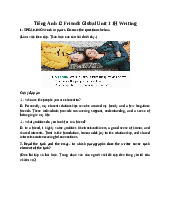




Preview text:
Tiếng Anh 12 Friends Global Review Unit 1 Reading
Read the text. Match sentences (A-F) with gaps (1-5). There is one extra sentence.
(Đọc văn bản. Nối câu (A-F) với khoảng trống (1-5). Có một câu bị thừa.) Gợi ý đáp án 1. E 2. F 3. A 4. C 5. D Listening
You will hear four speakers talking about how they met their best friends. Are the
sentences true or false? Write T or F. You will hear the recording twice.
(Bạn sẽ nghe bốn diễn giả nói về việc họ đã gặp những người bạn thân nhất của mình như
thế nào. Nhưng câu sau đung hay sai? Viết T hoặc F. Bạn sẽ nghe đoạn ghi âm hai lần.) Gợi ý đáp án Đang cập nhật Speaking
Work in pairs. Compare the photos. Then give your opinion about the importance
of sharing hobbies with others. Say whether you think there are differences between
sharing hobbies with family and with friends.
(Làm việc theo cặp. So sánh các bức ảnh. Sau đó đưa ra ý kiến của bạn về tầm quan trọng
của việc chia sẻ sở thích với người khác. Nói xem bạn có nghĩ rằng có sự khác biệt giữa
việc chia sẻ sở thích với gia đình và với bạn bè hay không.) Gợi ý đáp án
In picture A, a group of teenagers is enjoying rollerblading outdoors, showcasing an
active and dynamic hobby. Picture B, on the other hand, depicts a group of children
playing ball on the beach, highlighting a more relaxed and playful activity.
- Sharing hobbies with family can help strengthen bonds and create shared traditions. It
provides a unique opportunity for family members to spend quality time together and can
contribute to a sense of unity and understanding.
- Sharing hobbies with friends can introduce new perspectives and interests. It offers a
chance to build friendships based on common passions. Writing
It is often said that teens and their parents rarely get on well. Write an essay (180-
200 words) to give your opinion on this view and suggest advice to help make the relationship better.
(Người ta thường nói rằng thanh thiếu niên và cha mẹ của họ hiếm khi hòa hợp với nhau.
Viết một bài luận (180-200 từ) để đưa ra ý kiến của bạn về quan điểm này và đưa ra lời
khuyên giúp mối quan hệ tốt đẹp hơn.) Gợi ý đáp án
The perception that teens and their parents seldom get along well is a common stereotype
that doesn't universally hold true. While it's true that adolescence can bring about
challenges in parent-teen relationships due to changes in emotions, independence, and
identity, a harmonious connection is not unattainable.
In my opinion, fostering open communication is pivotal. Parents should actively listen to
their teens, acknowledging their perspectives and concerns. Similarly, teens need to
express themselves respectfully, understanding that parents often have valuable insights borne from experience.
Setting clear expectations and boundaries is another crucial aspect. Mutual respect for
each other's space and opinions helps in maintaining a healthy balance between
independence and guidance. Moreover, spending quality time together, engaging in
shared activities or family outings, can strengthen the bond and create lasting memories.
Patience is key on both sides. Recognizing that the teenage years are a period of self-
discovery and experimentation helps parents understand the challenges their teens may be
facing. On the other hand, teens should appreciate the efforts of parents in navigating this complex phase together.
In conclusion, while conflicts may arise, the notion that teens and parents rarely get along
oversimplifies the diverse range of relationships. By prioritizing communication, setting
boundaries, spending quality time, and practicing patience, families can nurture stronger
connections that endure the challenges of adolescence.



